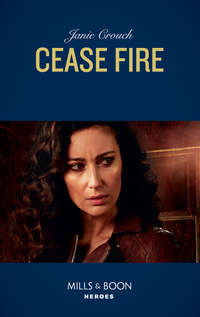
Полная версия
Fully Committed

Jon’s hazel eyes were close to hers and she could feel warmth where he was touching her.
“I’m going to be right here, okay?” he said. “Your lifeline, like we talked about yesterday. Everybody needs one in this line of work.”
Her lifeline. Yes, she needed someone to make sure she wasn’t going under. Jon would do that.
As if he could read her mind he said, “I’ll be right here. I won’t let you go under.”
Sherry took a breath and nodded. Okay, she could do this. At least she would try.
“I’m okay.”
He kissed her on the forehead. “You’re more than okay. You can do this.”
“I hope so.”
Fully Committed
Janie Crouch

JANIE CROUCH has loved to read romance her whole life. She cut her teeth on Mills & Boon Romance novels as a preteen, then moved on to a passion for romantic suspense as an adult. Janie lives with her husband and four children overseas. Janie enjoys traveling, long-distance running, movie watching, knitting and adventure/obstacle racing. You can find out more about her at www.janiecrouch.com.
To “my” Jon and Sherry: it has been such a joy for everyone to watch the two of you fall in love.
A beautiful romance that books—mine or otherwise—would only hope to imitate.
May you forever live out Ed Sheeran’s “Tenerife Sea.”
I’ll always think of you when I hear it.
Contents
Cover
Introduction
Title Page
About the Author
Dedication
Chapter One
Chapter Two
Chapter Three
Chapter Four
Chapter Five
Chapter Six
Chapter Seven
Chapter Eight
Chapter Nine
Chapter Ten
Chapter Eleven
Chapter Twelve
Chapter Thirteen
Chapter Fourteen
Chapter Fifteen
Chapter Sixteen
Chapter Seventeen
Chapter Eighteen
Chapter Nineteen
Chapter Twenty
Chapter Twenty-One
Chapter Twenty-Two
Chapter Twenty-Three
Chapter Twenty-Four
Chapter Twenty-Five
Chapter Twenty-Six
Extract
Copyright
Chapter One
Sherry Mitchell was pretty sure she was the only tourist on the beaches of Corpus Christi, Texas, wearing a long-sleeved shirt and jeans to try to help her relax. Especially since the late-afternoon heat was expected to spike toward one hundred degrees on this June day.
Granted, she was under a large, colorful beach umbrella that threw enough shade to protect her from a great deal of the sun’s rays and the heat. She was from Houston—a Texas girl born and bred—so was perhaps a little more adjusted to the heat than some of the tourists used to more temperate climates. But she’d still received a couple of odd glances.
She had her bathing suit—a red bikini she’d bought last week especially for this vacation—on under her clothes. Somehow she hadn’t been able to force herself to wear just the tiny scraps of cloth just yet.
Not that they were that tiny. The suit itself was pretty modest compared to some seen around here on any given day. Not to mention, it was quite attractive on her.
The problem wasn’t anything to do with a bathing suit or modesty or appearances at all. The problem was the iciness that seemed to have permeated Sherry’s very core recently.
She felt cold almost all the time. As if she would never be warm again.
Intellectually she knew that couldn’t be true. She knew this feeling—a chill even in upper-90s weather—was all a product of her mind, her psyche. Her body wasn’t really cold. She didn’t have some rare disease or unknown illness. It was all inside her head. She’d taken her temperature to make sure.
It had been completely normal.
Nothing was wrong with her physically. She’d double-checked with her doctor. Gone in for a physical. “A couple-years-late, quarter-of-a-century checkup,” she’d told him, not wanting to bring up the fact that she had the heater running at her house even though winter had long since passed.
Ironically the doctor had not only declared her completely healthy, but had congratulated her on being more grounded and wise than many people her age who tended to avoid physicals until something was wrong.
Sherry didn’t avoid physicals. But it seemed that her mind was doing its best to avoid reality.
She pulled her shirt around her more tightly. It wasn’t just the cold. She also couldn’t stand the thought of being exposed, of sitting out here with no cover. As if the clothing she wore would somehow keep her insides from fragmenting into a million pieces and flying away.
Icy and fragmented. Two words she would never have used to describe herself a year ago now fit her perfectly. She had seen too much, been close to too many people with shattered lives. Had worked for too long without a break, without giving herself a chance to recharge. To heal.
Now her mind was evidently taking over that duty for Sherry. She was getting a break from her work whether she wanted it or not.
Because if she thought the cold was bad on normal occasions, it was downright frigid every time she tried to pick up a pencil and sketch pad.
They both sat beside her under the umbrella on their own towel. She was further from picking them up than she was from stripping down to just her bathing suit and frolicking in the sun.
She missed drawing. Creating the pictures of what she saw in her head. And more recently, creating the pictures other people saw in their heads.
Unfortunately those had turned out to be hideous monsters. A shiver rushed through her and she brought her knees up to her chest, wrapping her arms around them and rocking herself slightly back and forth.
At one time she had drawn every day, all the time. Growing up, she’d drawn or painted or colored on anything she could get her hands on: notebook paper, computer paper, the insides of book covers.
As she’d gotten older and realized there were actual art supplies she could buy, she’d rarely been without a sketch pad. Drawing was a part of her. All her friends had learned that Sherry would always be drawing—and usually drawing the people around her—no matter what else was going on. They’d accepted her; had learned that just because there was a pencil flying in her hand and her nose was in her sketchbook didn’t mean she was ignoring them.
Her passion had driven her parents—both successful business owners, neither of them with any artistic ability or inclination—a little nuts. Both of them had small companies that could be handed down to Sherry if she would just do the smart thing: go to college and get a business degree. Or even better, a double major in business and something equally useful such as marketing or finance.
Sherry had double-majored, but in what she had found interesting: art and psychology. The psychology mostly because understanding what was going on inside the human mind made for more compelling drawings.
For the four years right after college Sherry had found moderate success in the art world. She wasn’t ever going to be rich, but she at least didn’t have to wait tables.
Then two years ago she’d stumbled onto what some people in law enforcement had termed her “obvious calling.”
Forensic art.
Sherry could admit it was the perfect blend of her natural artistic gifting and what she’d learned with her psychology degree. Once the FBI had learned that she was so good at it, she’d worked consistently—really beyond full-time—for them for the past two years. But if she had known the cost would be her love and passion for drawing, she had to wonder if she would ever have gotten involved with the FBI in the first place.
That seemed like such a selfish statement. She didn’t like to think that she would give up the breakthroughs she’d made in cases, the criminals she’d had a part in helping apprehend, just because it made her not want to draw anymore.
But she hadn’t even so much as picked up drawing materials for pleasure in more than six months. For the past five months, she’d drawn what she’d needed to for cases, although it had been difficult.
Then last month, after a particularly brutal case, the cold had started. She’d barely made it through her last two cases after that. Her boss at the FBI was glad Sherry was taking a couple of weeks off. It would allow her to “recover and come back fully recharged and ready to do what she did best—listen to a victim, get the picture in her mind and draw it so law-enforcement officers could put another bad guy away.”
That was a direct quote. And pretty much the farthest from reality than Sherry had ever felt.
How could she be ready to jump back into forensic art when, even now on vacation, with the vast beauty of the Gulf in front of her fairly begging Sherry to attempt to capture its beauty on paper, she couldn’t even pick up a pencil?
All she could do was keep from shivering and flying apart.
It was the third day of her two-week vacation in Corpus Christi. She’d actually made it outside today rather than just looking at the water from her house on the beach, one her parents owned but never used. So maybe she should cut herself a little slack.
She had made it to the beach today. That was enough. Tomorrow she would go a little further. Would actually pull out her sketch pad and draw something, even if it resembled a kindergartener’s stick figure. And even if she had to put a coat on to do it.
Maybe the day after that she’d actually take off her polar tundra gear and dip her feet in the Gulf. One thing Sherry had learned from working over and over with traumatized people was that you just had to take it a little bit at a time. It was okay to expect that same slow progress from herself.
In a few minutes she’d be driving into downtown Corpus Christi to pick up her friend Caroline. They’d gone to college in Dallas at the same time and had taken a few psychology classes together and then kept in touch. Caroline was a paramedic here in the city.
Sherry would at least slip on a short-sleeved blouse and skirt before meeting her friend. Caroline was already concerned about her. She would be even more worried if Sherry showed up dressed as she was now, particularly in this heat. Sherry hadn’t shared what was going on with her—she hadn’t wanted to worry her friend. But even without talking about it, she knew Caroline was concerned.
Dinner and margaritas on the back patio of Pier 99, a pier turned restaurant on North Beach, with a good friend and no pressures sounded perfect to Sherry.
No trauma. No stress. No need to force herself to draw. Just margaritas.
* * *
JON HATTON HAD a barbecue brisket sandwich—he wasn’t ashamed to admit that he’d developed an addiction to the Texas staple in his week of being here—almost up to his mouth when he received the brief text. Another rape victim. Memorial.
Even though it broke part of his heart, he dropped his half-eaten sandwich and stood.
Jon threw down a twenty, more than enough to pay for his meal at the diner plus leave the waitress a hefty tip, and was running out the door less than fifteen seconds after he received the text.
CHRISTUS Spohn Hospital Corpus Christi—Memorial for short—was right smack in the middle of downtown. Jon knew where Memorial was. But not because of any information local law enforcement had provided him, only because of the maps he had studied.
Corpus Christi PD was pretty pissed that Jon, a member of Omega Sector: Critical Response Division, was even here. They had made it clear they didn’t find his skills as a behavioral analyst and expertise in crisis management needed or welcomed.
That was just too damn bad because they very definitely had a crisis on their hands. Corpus Christi had a serial rapist on the loose.
Five rapes in just over eight weeks. Actually six now, if the current woman in the hospital was also a victim. The local police, as probably any police force of a city this size, didn’t have the resources to deal with this type of situation. People were in a panic and no breaks had been made on the case.
Corpus Christi PD had wanted to handle the situation themselves. But once the story made national news, that option was no longer available.
Omega had been called in and Jon, highly experienced with situations where multiple skills would be necessary—profiling, crime and linkage analysis, investigative suggestions, multiagency coordination—had been sent.
Jon was good at seeing the overall big picture, at catching details other people sometimes missed. At taking all the individual pieces involved in a case of this magnitude and putting them together so that the whole was more than the sum of the parts.
He was also a pilot, an excellent sharpshooter and could kill a man a dozen different ways with his bare hands. But that probably wasn’t in his official dossier.
No matter what list of credentials Omega had provided for Jon’s arrival to help with this case, it hadn’t made any difference with the locals. Every piece of information was only reluctantly shared. Jon was the last person notified for any possible lead.
But call him Rhett Butler because, frankly, Jon didn’t give a damn. He wasn’t in Corpus Christi to sit around holding hands and singing “Kumbaya.” He was here to stop a predator from victimizing more women.
A particularly smart predator who was too clever to leave behind any evidence so far.
So it wasn’t as if the Christi locals could be accused of not doing their jobs properly. Jon hadn’t been able to make as much as a single crack in the case himself, despite the time he’d spent in his week here interviewing victims and studying patterns.
It was a frustrating feeling when all he could do was wait for the bad guy to strike again and hope for a mistake. Not a feeling Jon was used to or that sat well with him.
This was the first victim that had been reported since Jon had arrived in town. He planned to make sure there wasn’t a next, regardless of how cooperative the Corpus Christi PD was. Or wasn’t.
The text notifying him of the victim hadn’t come from a member of the police department. Oh, Jon had no doubt they would eventually get around to notifying him of the victim’s existence. After all, none of them wanted to be accused of deliberately keeping info from him. But God only knew when that would actually be.
The text had come from Caroline Gill, a paramedic. Jon had met and befriended her and her partner, Michael Dutton, earlier in the week when he’d interviewed them about victim number two, whom they’d also transported a few weeks ago.
Dutton and Gill weren’t threatened by Jon’s presence here. They had talked openly with him about what they knew, what they’d heard. Jon had even asked them their theories about the case, since they had been the first people on one of the crime scenes.
Perhaps the paramedics’ opinions wouldn’t amount to anything useful whatsoever. But Jon had been doing this job for Omega Sector long enough to know that a break in a case could often come from unusual sources.
At the very least, his willingness to listen to them had gotten him the text that had him now driving through the city as fast as he safely could.
Jon parked at the closest nonemergency spot he could find at Memorial and jogged to the sliding glass of the emergency entrance door, ignoring the muggy heat that was so unlike the weather in his home state of Colorado. He pulled out his credentials to show the nurse at the front desk, explaining who he was here to see. He was glad when he saw Sara Beth Carreker, the head nurse who had worked in Emergency for years, walk up. Jon had talked to her a few days ago, also, since all the victims had been brought to Memorial’s Emergency Trauma Center.
Nurse Carreker’s nod was brisk. “I’ll show you back there myself. The patient has been moved into one of the private trauma care rooms.” Her lips pinched together.
“I take it that’s a bad sign?”
The nurse glanced at him as they walked down the hall. “Medically, it’s pretty neutral. Just my opinion, of course. You’ll have to ask the doctor for a professional statement.” The older woman’s eyes argued that she had seen more and probably knew more than a lot of the young doctors around here.
“So, physically she’ll recover. That’s not why she’s in the room.” Jon’s words weren’t questions.
“Yes.” Nurse Carreker nodded as they turned a corner. “Emotionally that woman needs as much privacy as she can get.”
“Anything you can tell me about her?”
“Young. A local. African-American this time, so that’s a little different. But the same type of bruising and craniofacial trauma.”
A black female. Jon’s jaw clenched. The demographic pattern of the women who had been attacked was widely varied, almost unheard of in a serial rapist. It was one of the reasons Corpus Christi PD had resisted asking for any federal help. Since serial rapists usually had a set type of woman they attacked, the department hadn’t thought the perpetrator was just one person.
Nurse Carreker stopped halfway down the hall. “Agent Hatton, y’all try to remember that this isn’t a case to that woman. Her whole world has just been destroyed.”
Y’all? Just because Jon didn’t use the word didn’t mean he didn’t know what it meant. How many people were here besides him? “Okay, thank you.”
The nurse patted him on the arm and left. Jon turned back toward the victim’s room. At least half a dozen of Corpus Christi’s finest were standing around outside the victim’s door. They alternated between glaring at and completely ignoring him as he approached.
Damn, this was going to be a long afternoon.
Chapter Two
Jon noticed that Zane Wales, the detective he’d been working most closely with—closely being a very relative term—was busy cross-referencing something on his smartphone with a file in his hands. The younger man made it a point not to make eye contact. Wales should’ve been the one who had called or texted Jon, not the paramedic.
Jon tamped down his frustration. This wasn’t the time or place to get into it with Wales again. Especially because he knew the captain at the local police department all but applauded Wales’s attitude. He encouraged any and all negative attitudes toward Jon.
“Hatton,” Wales said neutrally in greeting. The man actually wore a cowboy hat all the time. Since they were in Texas that shouldn’t surprise Jon, but it was still a little unsettling.
“Wales.” Jon raised an eyebrow, but didn’t say anything further.
“Doctor’s with the victim, so no one can go in yet.” Wales put himself between the door and Jon as if Jon were going to barge his way in. Jon barely restrained himself from rolling his eyes.
He looked over at the uniformed officers milling around, half a dozen of them, all male. They all wanted to be here, be somewhere nearby so they could help if needed. While Jon appreciated the gesture, they had to leave.
He turned back to Wales. “A little crowded out here, don’t you think, for a woman who’s just been brutally attacked?”
Wales looked a little surprised that Jon had said something reasonable. Probably had expected him to pick a fight about not being notified.
“Actually, I agree,” Wales said. “The last thing that woman is going to want or need is a bunch of people—men especially, probably—out here hanging around.”
The detective’s statement reassured Jon on multiple levels. First, he had already been aware of the problem before Jon even pointed it out and would’ve handled it himself soon, hopefully. Second, Wales might not like him or the fact that he had been assigned to the case, but at least he wasn’t going to do something potentially case-damaging such as keep a bunch of unnecessary people there just to spite Jon. The victim was Wales’s priority.
So cowboy hat notwithstanding—the jury was definitely still out on that—the young detective had just proved himself to be at least competent and focused.
Jon backed out of the way as Wales went to talk to the uniformed officers and dismiss them. He could hear him reassure the men that they personally would be the first ones called if anything could be done for the victim or if any further help was needed. He was glad to see Wales wasn’t a jerk in general.
Just with him, evidently.
After the uniforms left, Wales made his way over to Jon. Both knew it could be some time before they were able to talk to the victim, depending on the extent of the physical and emotional trauma. But sooner was definitely better, while everything was, unfortunately, still fresh in the victim’s mind.
They’d have to wait until the doctor came out to give them more information.
“Do we know anything about the victim?” Jon gave it about a fifty-fifty chance that the detective would be forthcoming with information.
Wales hesitated but then responded.
“Vic’s name is Jasmine Houze. She’s twenty-seven, not married, lives on Mustang Island, which is out near the beach. Works for Flint Hill Resources, an oil company.”
Corpus Christi, in Jon’s opinion, was a city with an identity crisis: part touristy beach town, part oil/shipping industry. Both businesses seemed to vie for what the city would be known for. There were lovely beaches, but if you wandered too far from them you were right in the middle of oil industry with their buildings and warehouses and machinery. So you had all types of people in the city’s makeup.
“Nurse said there was similar craniofacial trauma?” Jon asked.
“I haven’t seen her yet or any medical records to confirm,” Zane Wales responded. “But, yeah, I understand that’s the case.”
The extent of the woman’s wounds would determine a lot, such as how soon they could question her and to what degree she would be able to coherently remember facts.
It was a full hour later before the doctor, a female, and two female nurses came out. The doctor closed the door behind her in a way that suggested no one would be entering soon.
“Gentlemen,” the doctor said in greeting.
“How is she, Dr. Rosemont?” Wales asked. “Is it possible for us to speak with her?”
Jon stayed a half step back. It was better for local detectives to take the lead in these types of cases, he knew from experience. He would only jump in if necessary.
Although the nurses left to complete their other duties, the doctor positioned herself even more solidly in front of the door.
“As I’m sure you can imagine, Ms. Houze is in a delicate state right now, both physically and emotionally.” The doctor crossed her arms over her chest.
Jon was glad to see Wales nodding, taking seriously what the doctor was saying. It was important to talk to Ms. Houze, but it was also important to remember that this was the worst day of her entire life.
“We understand,” Wales said. “And we want to be sensitive to the situation. But talking to her soon is important, if medically possible.”
“Ms. Houze has significant bruising to her face and jaw. The rapist struck her a half-dozen times in rapid succession to stun her. She’ll have no permanent damage from those blows, but both her eyes are currently swollen shut.”
That was undoubtedly what the attacker had intended, so the victim wouldn’t be able to identify him. Jon grimaced. The same thing had happened in the other cases. As a matter of fact, the facial abuse was what had helped alert them to the fact that this was the work of a single man.









